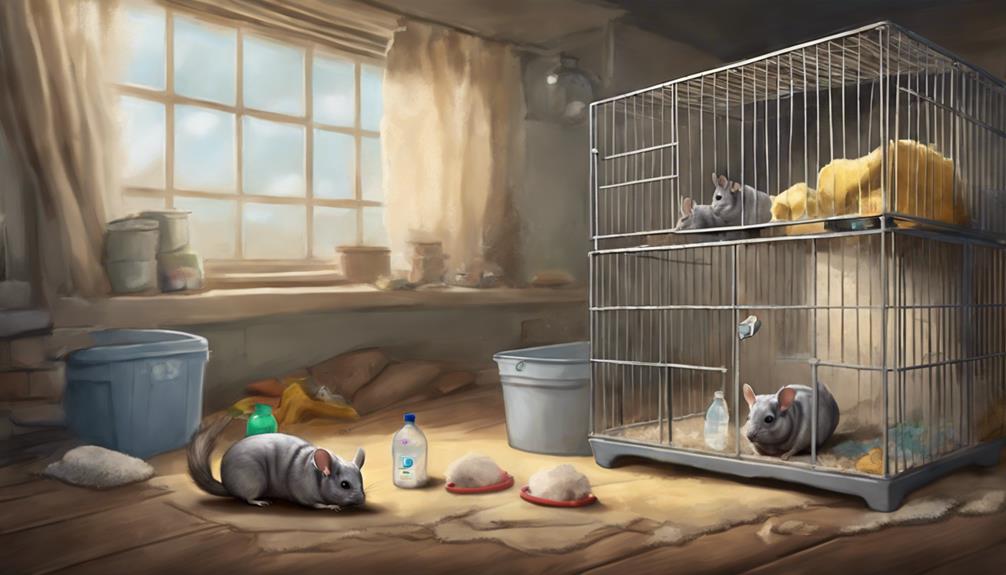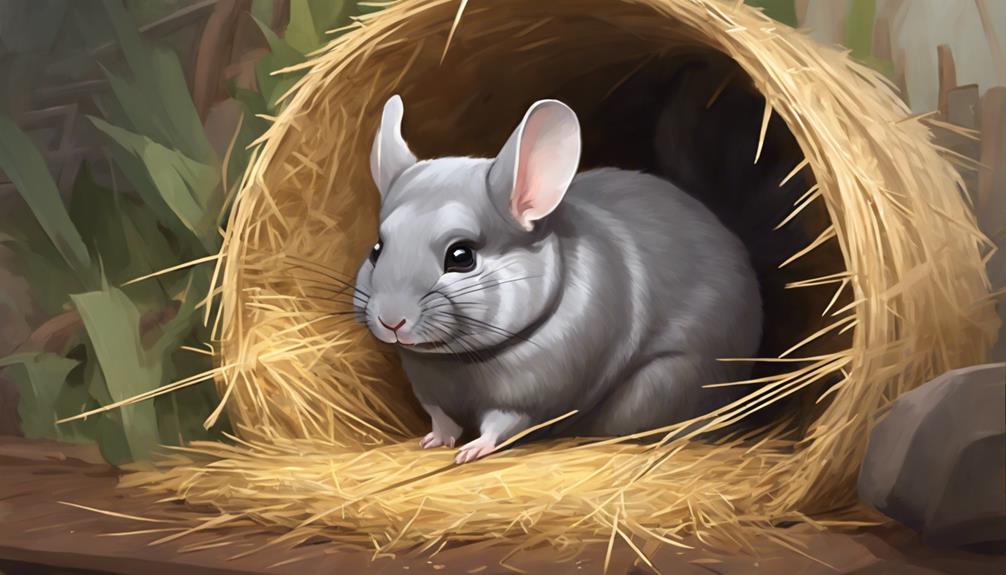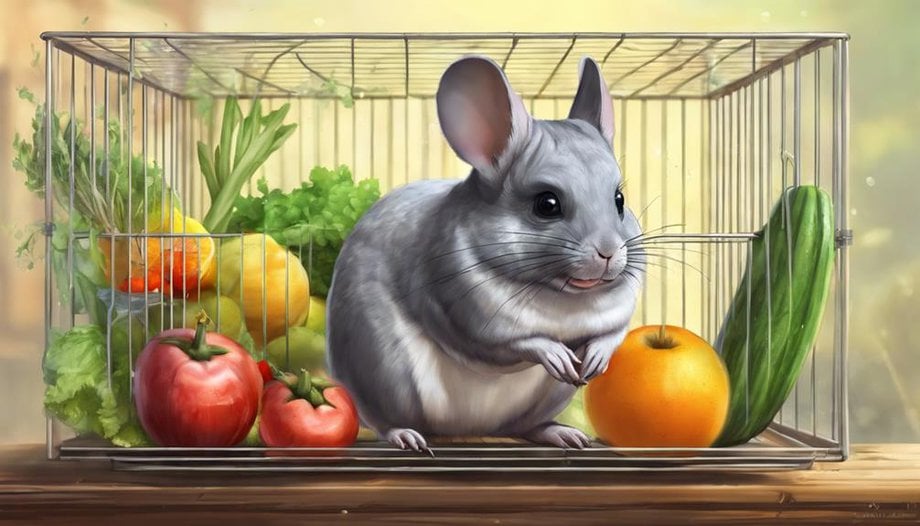What to Do to Keep Your Chinchilla's Cage Odor-Free

- Clean the cage regularly by removing old bedding and wiping down surfaces with a pet-safe cleaner.
- Use a high-quality, dust-free bedding material to absorb moisture and odor.
- Provide a litter box and encourage your chinchilla to use it to contain waste.
- Ensure proper ventilation in the cage by keeping it in a well-ventilated area and using a small fan if needed.
- Avoid using strong-smelling cleaning products or air fresheners near the cage, as they can be harmful to your chinchilla's respiratory system.
Key Takeaways
- Use high-quality, dust-free bedding for odor control.
- Adhere to a strict cleaning schedule to prevent odors.
- Ensure proper ventilation in the cage for fresh air.
- Avoid strong-smelling cleaning products for chinchilla's health.
Proper Cage Cleaning Schedule
To maintain a fresh and odor-free environment for your chinchilla, adhere to a strict cleaning schedule that includes daily spot cleaning and weekly deep cleaning of the cage. Consistency is key when it comes to odor control, so establishing a routine is critical. Daily spot cleaning involves removing any droppings, uneaten food, or other messes your chinchilla may have made. This quick clean-up not only helps in odor control but also guarantees a hygienic living space for your pet.
In addition to daily spot cleaning, weekly deep cleaning is essential for maintaining a healthy environment for your chinchilla. This involves changing all bedding, scrubbing the cage with a pet-safe cleaning solution, and thoroughly drying all surfaces before adding fresh bedding. By sticking to this cleaning frequency, you can prevent the buildup of bacteria and ammonia that can lead to unpleasant odors.
Use of Absorbent Bedding
Consider using a high-quality absorbent bedding to help maintain a clean and odor-free environment for your chinchilla. When it comes to controlling odors in your chinchilla's cage, the right bedding can make a significant difference. Opt for bedding options specifically designed for small animals like chinchillas, such as paper-based bedding or aspen shavings, as they're known for their excellent absorbency and odor control properties.
Absorbent bedding works by soaking up moisture and trapping odors, preventing them from lingering in the cage. By regularly changing the bedding and spot-cleaning soiled areas, you can effectively minimize odors and keep your chinchilla's living space fresh and clean. When selecting bedding, prioritize quality over price to make certain ideal odor control and comfort for your pet.
Good Ventilation Practices
Proper ventilation is essential for maintaining a fresh and healthy environment in your chinchilla's cage. Good ventilation practices guarantee adequate air circulation and help control humidity levels, which are vital for preventing odors from building up.
Here are some tips to enhance ventilation in your chinchilla's living space:
- Choose the Right Cage: Opt for a cage with proper ventilation holes or mesh sides to allow air to flow freely through the enclosure.
- Strategic Placement: Position the cage in a well-ventilated area with good airflow to aid in odor control.
- Regular Air Circulation: Open windows or use fans to promote air exchange within the room where the chinchilla's cage is placed.
- Clean Air Filters: If using an air purifier, guarantee filters are clean and functioning effectively to maintain fresh air quality for your pet.
Regular Spot Cleaning Routine
How can you efficiently maintain a fresh and hygienic environment for your chinchilla? Regular spot cleaning is key to assurance control and making sure your pet's well-being. By incorporating simple cleaning techniques into your routine, you can keep your chinchilla's cage smelling fresh and clean.
Start by conducting a daily check of your chinchilla's cage. Remove any wet spots or soiled bedding promptly to guarantee odors from developing. Spot clean any areas where your chinchilla tends to urinate frequently, such as corners or favorite spots. Utilize pet-safe cleaning products or a mixture of vinegar and water for effective odor control without harming your chinchilla.
Incorporate a weekly deep cleaning session where you remove all bedding, toys, and accessories from the cage. Thoroughly clean and disinfect the cage with a pet-safe cleaner to eliminate any lingering odors. Assure everything is completely dry before putting it back together.
Providing Fresh Hay Daily

To maintain a fresh and hygienic environment for your chinchilla, guaranteeing their cage remains odor-free, it's imperative to provide fresh hay daily. Here are essential tips for providing fresh hay to your chinchilla:
- Hay storage: Store hay in a dry, well-ventilated area to prevent mold growth, which can be harmful to your chinchilla's health.
- Hay quality: Opt for high-quality hay, such as Timothy hay, which is essential for your chinchilla's digestive health and overall well-being.
- Daily replenishment: Assure your chinchilla always has access to fresh hay by replenishing their hay rack or hay feeder daily.
- Monitor consumption: Keep an eye on how much hay your chinchilla eats daily. Adjust the amount provided to assure they've enough without excessive waste.
Avoiding Overcrowding in the Cage
Chinchillas, like all animals, require adequate space in their environment for both comfort and health. Overcrowding can lead to stress and territorial issues, impacting their overall well-being.
Ensuring a clean and spacious cage promotes a healthier living environment for these delicate pets.
Space for Comfort
Ensuring ample space within your chinchilla's cage is essential for their comfort and well-being. Chinchillas are active animals that require enough room to move around freely and engage in their natural behaviors. Here are some tips to provide adequate space for your furry friend:
- Cage Layout: Arrange the cage with platforms and ramps to maximize vertical space.
- Playtime Activities: Allow your chinchilla supervised playtime outside the cage for exercise.
- Avoid Overcrowding: Limit the number of accessories and toys to prevent overcrowding.
- Provide Hideouts: Include cozy hiding spots in the cage for your chinchilla to feel secure.
Cleanliness Promotes Health
A well-maintained cage with adequate space for your chinchilla is paramount to ensuring their health and well-being. Regular grooming and odor control are essential aspects of maintaining a clean environment for your pet. Avoid overcrowding the cage to prevent stress and potential health issues. Here are some tips to guarantee your chinchilla's cage remains fresh and hygienic:
| Cleanliness Tips | Benefits |
|---|---|
| Regularly remove waste | Prevents odor buildup |
| Replace bedding | Maintains freshness |
| Provide dust baths | Helps chinchilla groom |
| Clean food/water bowls | Prevents bacterial growth |
| Use pet-safe cleaners | Ensures a safe environment |
Monitoring Chinchilla's Diet

To maintain a healthy living environment for your chinchilla, monitoring its diet is essential. Here are some key points to bear in mind when it comes to your chinchilla's diet:
- Dietary Restrictions: Chinchillas have specific dietary restrictions that need to be followed strictly. Avoid giving them foods high in fats, sugars, or too much calcium as these can lead to health issues.
- Nutritional Balance: Make sure your chinchilla's diet is well-balanced. Provide a mix of high-quality pellets, fresh hay, and occasional treats like dried fruits or nuts to keep them healthy and happy.
- Fresh Water: Always make sure your chinchilla has access to fresh, clean water. Hydration is vital for their overall well-being.
- Monitor Food Intake: Keep an eye on how much food your chinchilla consumes daily. Overeating can lead to obesity and other health problems, so it's important to regulate their food portions.
Frequently Asked Questions
Can Chinchillas Be Potty Trained to Help Reduce Cage Odor?
Chinchillas can be potty trained, aiding in reducing cage odors. This training, though effective, requires patience and consistency. Maintaining cage hygiene complements training efforts, ensuring a fresh environment for the chinchilla.
How Can I Prevent My Chinchilla From Kicking Bedding Out of the Cage?
To prevent a chinchilla from kicking bedding out of the cage, guarantee proper containment by using a deep tray or attaching a barrier. Understanding chinchilla behavior and organizing the cage can also help control odor effectively.
Are There Any Specific Cleaning Products That Should Be Avoided When Cleaning a Chinchilla's Cage?
When cleaning a chinchilla's cage, it's essential to steer clear of harsh chemicals like bleach, ammonia, and other strong disinfectants. Opt for safe disinfectants and natural odor control methods to keep the environment healthy and pleasant for your furry friend.
What Are Some Signs That My Chinchilla's Cage May Be Too Crowded?
A chinchilla's cage space should allow for movement and enrichment. Signs of overcrowding include increased aggression, restlessness, and decreased activity. Inadequate cage size can impact a chinchilla's health and lead to stress-related issues.
How Often Should Chinchilla Toys and Accessories Be Cleaned to Reduce Odor?
To keep a chinchilla's cage fresh and promote their well-being, it's wise to clean toys and accessories weekly. Regular rotation of toys helps control odor. This simple routine safeguards a clean environment and a happy pet.











